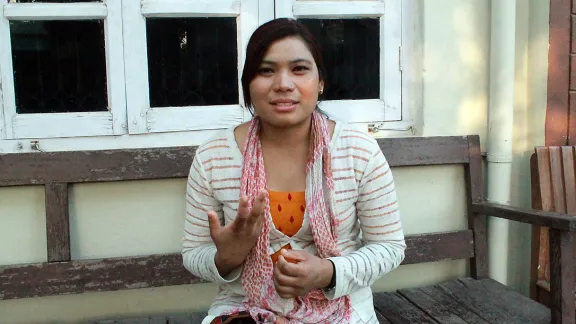
Basanti Chaudhary in the KPUS office. Photo: LWF/ Chandan Shilpakar
A former house servant becomes an advocate against bonded labor
(LWI) It was a foggy November morning in Kailali district, western Nepal, when Basanti Chaudhary (32) received a phone call. Her brother-in-law told her that she had won the N-Peace Award, a recognition of her work against the traditional system of bonded labor in Nepal. Chaudhari received the news, and went to work again, visiting the family of a former bonded laborer and convincing them not to sell their daughter to work in the household of another family.
LWF has been advocating against bonded labor in Nepal for 35 years. The system of Kamaiya (literally translated as hard working farm hand) was formally abolished in 2000, the practice of Kamlari (the female version of the word) was only outlawed in 2013. But the practice continues. The bonded labor system has been there for centuries, affecting predominantly certain ethnic groups in Nepal as well as people belonging to the lowest Hindu caste (Dalits).
The N-Peace Award was initiated in 2011 by the United Nations Development Programme, to recognize peace activists in Asia. The N-Peace network supports women’s leadership for conflict prevention, resolution and peacebuilding from grassroots to national level. Basanti Chaudhari received the award in November 2016, for her advocacy campaigns against bonded labor, organizing former bonded laborers and supporting their rehabilitation and livelihood. The Lutheran World Federation (LWF) in Nepal was part of that journey.
“This is a true recognition to the former Kamaiyas and Kamlaris in Nepal. Therefore, it was the happiest moment in my life”, Chaudhary said.

Basanti Chaudhary receives the N-Peace award for her work.
Working as a six-year-old girl
Chaudhari herself is a former Kamlari. The word literally translates as “hard working woman”. Born in a village named Basauti, her family left the ancestral land when she was three years old, to work in another village to pay off a debt. In return for their work, her parents received food, accommodation and 300 kg of rice every year. As this was not enough to live on, her parents sent Chaudhary to work as Kamlari to a family in the same village. At that time Chaudhari was six years old.
Serving as Kamlari means I had to support my landlord’s family in all the domestic chores. Since I was only a little girl, I had to take care of a baby at the beginning.
Poverty is the main reason for families to sell themselves and their children to pay off debts by working in fields, gardens and other people’s households. “Serving as Kamlari means I had to support my landlord’s family in all the domestic chores,” Chaudhary recalls her early childhood. “Since I was only a little girl, I had to take care of a baby at the beginning.” Later she was given additional chores, like feeding the animals and preparing meals for the family, while the children in the vicinity went to school.
The working conditions for Kamlaris vary, but being very young and in a position without rights, they were usually exploited. Often, the girls and women would work for room and board, getting leftover meals and a place on the floor to sleep. They were denied an education and were defenseless against mistreatment and abuse. Their families would sometimes receive some money in return, but often, girls were sold by their parents because their own family could not support them.
From servant to social activist
Chaudhary was allowed to go to school, together with the son of the family she was serving. “I was top of my class every year while my Didi Bhinaju’s son was just an average student”, Chaudhary explains the reason why her landlords encouraged her to continue her studies. “My parents couldn’t even understand the meaning of that success.”

The bonded labor system is still strong in Kailali district in western Nepal.
When she was twelve years old, she returned to her parents, who were living in a temporary shelter. Even though they had been freed and their debts cancelled, the former Kamaiya had no land or means of income. Many had been evicted by former landlords without any support. The promised support by the Nepali government, to give them land and some money to build a new house, was handed out slowly.
LWF Nepal supports former bonded laborers in advocating for their rights and engaging with authorities to receive their compensation. Chaudhary joined a women’s group formed by LWF and local partner Kamaiya Pratha Ulmulan Samaj (Kamaiya System Eradication Society, KPUS) and continued her formal education, now with an LWF scholarship. Soon she started giving workshops herself and developing campaigns. In 2012, she was elected as the chair of KPUS, and has been advocating for the rights of former bonded laborers and their rehabilitation since.
A source of inspiration
“She became a source of inspiration for a number of former bonded laborers in Kailali and other adjoining districts,” her colleagues say.
Today KPUS has 3,400 members, campaigning against a number of issues affecting former Kamaiyas. Among them are outstanding rehabilitation, domestic violence and child abuse. Despite being free and entitled to land support, the former Kamaiyas still have no access to the shelter construction fund and timber required for house construction.
More than 27,000 former Kamaiyas and 13,000 former Kamlaris in the district still wait for rehabilitation. Under Chaudhary’s chairmanship, KPUS has supported 200 women survivors of violence with livelihood initiatives. Advocating for their rights will be Basanti’s top priority. “People are forced into bonded labor mainly due to socio-economic and ethnic discrimination,” she said upon receiving the award.
“I strongly feel that the political empowerment of women is necessary for them to show significant participation in the peacebuilding process.”
By Umesh Pokharel/LWF Nepal. Edited by LWF communications.


